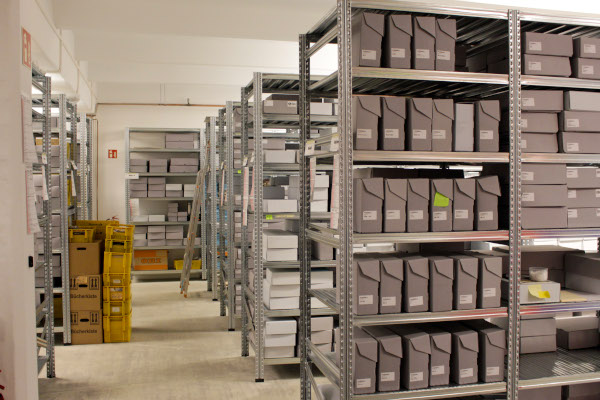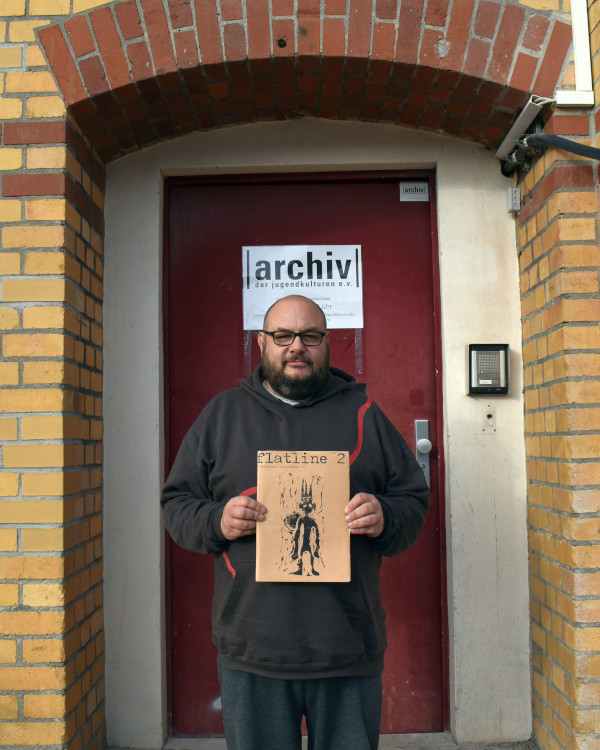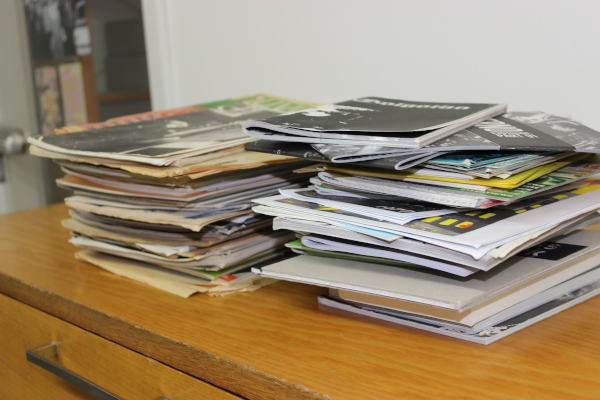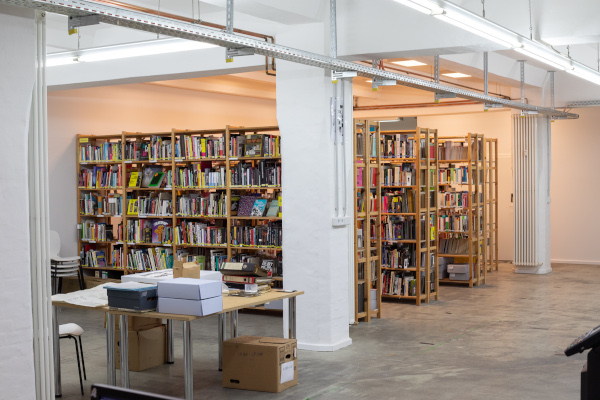
Fifth episode dedicated to the discovery, through interviews, of centres, associations, institutions in Europe and around the world, dedicated to the preservation, study, production and dissemination of fanzines. The first interview: gianLuca Umiliacchi, founder of the Archivio Nazionale Fanzine Italiane – Fanzinoteca d’Italia 0.2 – Centro Nazionale Studi Fanzine, Italy (here); the second: Andrew Hales, curator of La Fanzinothèque de Poiters, France (here); the third: Nicolas Groilleau, co-curator of La Petite Fanzinoteque Belge, Belgium (here). The fourth: Zines, Italy (here). Now I move on to Berlin to interview Christian Schmidt and Jens Niemeyer, from the Archiv Der Jugendkulturen in Berlin, Germany. I discovered this important archive thanks to Andrew Hales, curator of La Fanzinothèque de Poitiers, France. It was natural to contact them to include them in this series. As you will read in the interview the library and archive of Archiv der Jugendkulturen contains a unique collection of youth-, pop-, and subcultural materials such as magazines, fanzines, books, textiles, posters, audio files, videos, buttons, stickers, and much more on punks, rave, goth squatter, graffiti scene or queer-feminist zines. Definitely a European reference point for those who love, live and study fanzines and not only.
As always I invite you to read, and then as soon as you can go in person to discover or rediscover this incredible and interesting archive of the world fanzinaro.
Here You can find the Italian Translation
How did the Archiv Der Jugendkulturen come about?
Archiv der Jugendkulturen (Archive for Youth Culture) was founded by journalist Klaus Farin and other people from academics and several subcultures in Berlin in 1997. Then, the archive filled an information gap in Berlin. In the 90s, Berlin was a subcultural hotspot in Germany. Especially the Techno, Hip-Hop and Punk and Squatting Scenes were very active. Besides that, the state, municipal or university archives and libraries were not interested in archiving artifacts and products from these movements.
Since then, Archiv der Jugendkulturen is a memory of the scenes, from science fiction, gothic and graffiti to punk, riot grrrl and techno. Our archive a non-profit-organisation in Berlin that has been collecting documents and ephemera of youth-, pop-, and subcultural scenes since 1997. State institutions barely collect these histories of resistance which makes self-organized archives like ours unique. We are convinced that these scenes are an important part of cultural and social history and that their relics should be permanently preserved. Over the years we have become an important place for people from youth and subcultures as well as activists, researchers, academics, historians and political educators and the interest for our unique collection continues to grow.
The library and archive of Archiv der Jugendkulturen contains a unique collection of youth-, pop-, and subcultural materials such as magazines, fanzines, books, textiles, posters, audio files, videos, buttons, stickers, and much more. We collect treasures that no other public institution in Europe collects; whether it’s the estates of punks, documents from the squatter scene, posters from goth concerts, photos of ravers at the Loveparade, art from the graffiti scene or queer-feminist zines.
It takes a free, self-organized archive to collect these subcultural treasures, tell their stories and preserve them for future generations.
Core of our collection is our zine collection with more than 20.000 copies.

Where is it?
For more than 25 years we are located at Fidicinstrasse 3 in Berlin-Kreuzberg (near underground station “Platz der Luftbrücke”) in the immediate vicinity of Tempelhofer Feld, a large park that used to be an airport.
What kind of fanzines do you have on file?
We collect a huge range of zines – from Science Fiction over Punk to Queer Zines. Actually, we are the archive with the bigges zine collection in Germany. Nobody knows how much zines we actually have, but it’s more than 20.000 copies from all over the world since the 1950s. To give you a better impression of our collection, check out the following YouTube-Video:
https://youtu.be/FwwkjBCDF6o?si=mZ5W1jPaEdPLgu5i
You can get an overview of the collection’s genres in our brochure in fanzine format. Here is the link to the pdf in English:
https://www.jugendkulturen.de/files/archiv/pdfs/210604_jugendkulturen_PopSub_Web_EN.pdf

How the collection is stocked? Are you looking for new fanzines or are they sent directly to Archiv Der Jugendkulturen?
We host the collection in an archival storage room on its own. We are always trying to expand our collection, making it more international and diverse. Unfortunately, we don’t have the money to buy new zines on a regular base, but we rely on donations. So, anyone reading this who thinks his zine should be preserved forever, please send us a copy. We would be very grateful and promise to take good care of it.

How can you enjoy the Archiv Der Jugendkulturen?
If you want to visit us and have a look at our collected zines, please send us an e-mail at bibliothek@jugendkulturen.de and we will and we will arrange an appointment with you.
Right now, our opening time is Tuesday, 11:00-18:00.
Do you have any interesting and funny anecdotes about the collection and about the “fanzinzinari” who got to know with Archiv Der Jugendkulturen?
There are many anecdotes and stories, but the best way to tell them is on a guided tour through the archive.

Is the Archiv Der Jugendkulturen in contact with other archives, museums dedicated to fanzines? For example, Archivio Nazionale Fanzine Italiane – Fanzinoteca d’Italia 0.2 – Centro Nazionale Studi Fanzine, or la Fanzinothèque de Poiters, or La Petite Fanzinotèque Belge, or the Fanzinoteca del Museo Universitario del Chopo to Mexico?
Yes, we are losely connected to zine libraries troughout Europe – especially La Fanzinothèque in Poitiers, Schikkimikki Zine Library in Berlin, La Petite Fanzinethèque in Belgium, Archiv českých a slovenských subkultur in Prague and so on. Last year we had some kind of an “exchange program” with the people from Poitiers. Christian visited them in the summer and is still amazed by their collection and their work.
We would like to strengthen our relations to other zines libraries and archives in the future and build up an European network of public zine collections.

Does it still make sense to talk about paper fanzines in an increasingly digitalized world? Do you plan to store fanzines in different formats other than paper?
We think that printed zines still matter in a digital time and therefor we still focus on these. But besides that we also have audio and video tape zines and zines in other forms of media within our collection.
We now have a digital computer reading station where visitors can view not only films and photos but also digitized fanzines. We have small cooperations with other collectors, so that we could digitize parts of our German punk fanzines from the 80s.

From your “privileged” point of view, how is the printed fanzine received in Germany? Which genres do you think have a greater impact on the society that enjoys the fanzine?
In Germany, the fanzine is slowly spreading in the cultural sphere, with adult education centers and public libraries now offering fanzine workshops. Football culture also accounts for a very large proportion of fanzine sales. Also mini-fanzines about everyday life’s things are booming at the moment.

Is the Archiv Der Jugendkulturen on social media?
We have a facebook and instagram account. We usually make a posting about our collection or currents projects twice a week. Here are the links:
https://www.facebook.com/archivjugendkulturen
https://www.instagram.com/archiv_der_jugendkulturen/

Is the Archiv Der Jugendkulturen open to collaborations with associations, bodies, etc. etc.?
We always love to collaborate with other people, bodies and associations. Just get in contact with us!
Inevitable final question: do you have any future projects such as a documentary telling the story of the Archiv Der Jugendkulturen, or a book or anything else?
There are currently no plans to develop a book about the archive. However, if there is capacity among the archive’s active members, it would definitely be nice to have a book about the archive for the 30th anniversary.
Link: Archiv Der Jugendkulturen Home Page
Link: Archiv Der Jugendkulturen Facebook Page
Link: Archiv Der Jugendkulturen Instagram Profile
